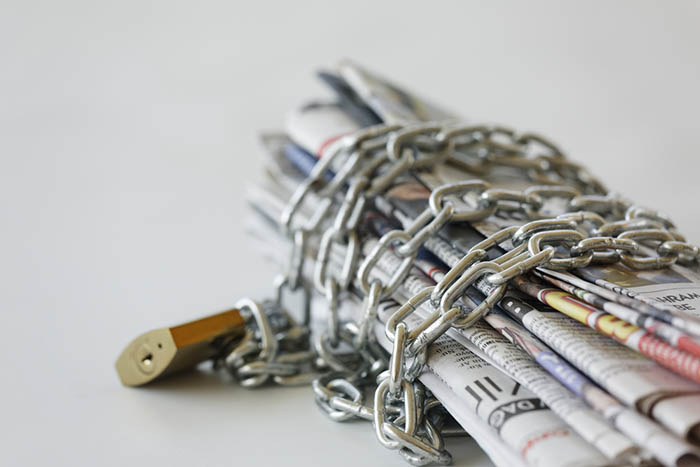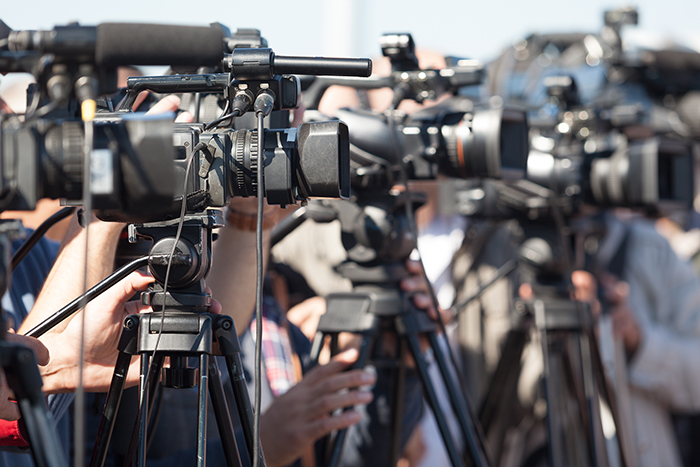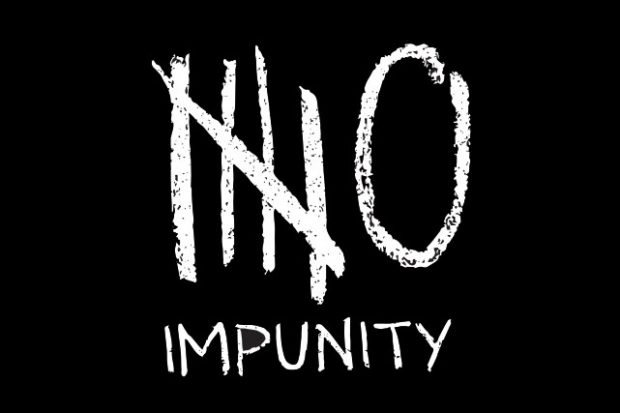31 Jan 2017 | Azerbaijan, Belarus, Europe and Central Asia, France, Mapping Media Freedom, News, Russia, Ukraine, United Kingdom
[vc_row][vc_column][vc_column_text]
Each week, Index on Censorship’s Mapping Media Freedom project verifies threats, violations and limitations faced by the media throughout the European Union and neighbouring countries. Here are five recent reports that give us cause for concern.
Police detained Aleksandra Ageyeva, a correspondent for the media outlet Sota Vision, at a mass demonstration near the Russian Constitutional Court building on 24 January.
According to Ageyeva, she was detained while filming the detainment of a demonstrator who was protesting against the imprisonment of opposition human rights activist Ildar Dadin.
Dadin is the first Russian citizen to be convicted for a “repeated violation” under a new law on mass rallies and meetings by peacefully protesters. He is currently serving a two-and-a-half year prison sentence and claims that his captors repeatedly abuses him.
A total of four protesters were detained along with Ageyeva at the scene. The police explained that the demonstrators were detained because they were supposedly jaywalking. Ageyeva spent around 11 hours in police custody.
The General Prosecutor’s Office of Belarus ruled to extradite Alexander Lapshin, a Russian-Israeli travel blogger to Azerbaijan, on 20 January.
On 15 December 2016 he was detained in Minsk on an extradition request from Azerbaijan, where he is wanted for visiting the disputed region of Nagorno-Karabakh and for criticising Azerbaijani policies.
A criminal case under two articles of the criminal code was filed in Azerbaijan which, if convicted, can lead to a prison sentence from five to eight years.
Lisa Giachino, editor-in-chief of the environmental magazine L’âge de faire, was arrested on 20 January at the border with Italy in the Roya valley, as she was following migrants for a story, news website Basta reported.
She is believed to have been kept in custody since 5am for “assisting migrants at the border,” and because she does not have a press card the police have refused to believe she is a journalist.
According to Nice Matin newspaper, Giachino was following six migrants for the story.
Giachino was later freed. She told Libération: “[Police officers] told me: ‘If we see you again with migrants, careful!’ It’s not normal to tell this to a journalist.”
Oleksiy Bobrovnikov, an investigative journalist and special correspondent for TSN programme on 1+1 TV channel, publicly wrote on his Facebook on 10 January that he left Ukraine after receiving numerous threats.
Since 2015 Bobrovnikov has been investigating the fatal shooting of officers and volunteers who oppose smuggling along what is known as the “grey zone,” the dividing line between western Ukraine and the self-proclaimed Donetsk and Luhansk People’s Republics.
Bobrovnikov confirmed to Mapping Media Freedom that he left the country in mid-December because he feared his life was in danger. He said he had received five warnings connected with his investigation telling him his life was in danger.
“The threats ranged from a pat on the shoulder to threats coming from people with weapons in their hands. Other people investigating trade with occupied territories also received similar threats,” Bobrovnikov wrote.
According to Ukrayinska Pravda, two individuals working to fight against the smuggling were killed on 2 September 2015, near Schastye, a town in the Luhansk region.
St Helens Council passed a motion on 18 January calling on retailers in the borough to stop selling daily newspaper The Sun, The St Helens Star reported.
The motion is not enforceable by law, but recommends retailers do not distribute the publication.
At the council meeting on Wednesday evening, Parr councillor Terry Shields asked the authority to support the Total Eclipse of The Sun campaign, which the paper’s controversial coverage of the Hillsborough disaster as a reason to boycott.
The campaign describes itself as a peaceful campaign group with more than 50,000 members.
Councillors approved the motion at the town hall. The three Conservative councillors abstained from the vote.
A spokeswoman says: “We have enjoyed great success now having over 240 establishments not selling the paper. This includes small newsagents, major supermarkets and petrol stations. Cafes, pubs, hotels and local hospitals, have also joined in, showing their support to the campaign.”[/vc_column_text][vc_column_text]
Click on the bubbles to view reports or double-click to zoom in on specific regions. The full site can be accessed at https://mappingmediafreedom.org/
[/vc_column_text][/vc_column][/vc_row][vc_row][vc_column][vc_basic_grid post_type=”post” max_items=”4″ element_width=”6″ grid_id=”vc_gid:1485518684846-d4098701-7bc7-6″ taxonomies=”6564″][/vc_column][/vc_row]
16 Jan 2017 | France, Greece, Mapping Media Freedom, News, Russia, Turkey, Ukraine
[vc_row][vc_column][vc_single_image image=”81193″ img_size=”full”][vc_column_text]Each week, Index on Censorship’s Mapping Media Freedom project verifies threats, violations and limitations faced by the media throughout the European Union and neighbouring countries. Here are five recent reports that give us cause for concern.
A Hatay court issued a detention order for Ceren Taşkin, a reporter for the local newspaper Hatay Ses, on the basis of her social media posts, news website Gazete Karinca reported.
Taşkin was detained earlier for “spreading propaganda for a terrorist group” via her social media posts. Taşkin was arrested and sent to prison on 12 January on the same charges.
Her arrest brings the number of journalists in prison to 148, Platform 24 reported.
The National Radio and TV Council has banned independent Russian television channel Dozhd from broadcasting in the country.
“The channel portrayed the administrative border between Crimea and Kherson region as the border between Ukraine and Russia,” national council member Serhiy Kostynskyy said during a council meeting, Interfax-Ukraine reported.
According to Kostynskyy, the channel repeatedly violated Ukrainian law in 2016 by broadcasting Russian advertising and having Dozhd journalists illegally enter annexed Crimea from the Russian Federation without receiving special permission.
The ban is set to be officially published by the authorities on 16 January, Interfax-Ukraine reported.
Dozhd Director Natalya Sindeyeva said that the channel is broadcasting through IP-connection without direct commercial advertising in Ukraine and follows the Russian Federation law requiring that media outlets use maps to show Crimea as part of Russia.
Dunja Mijatovic, media freedom representative at the Organization for Security and Cooperation in Europe, wrote on her Twitter that this decision is “very damaging to media pluralism in Ukraine.”
Police arrested Giannis Kourtakis, publisher of Parapolitika newspaper, and its director, Panayiotis Tzenos, following a lawsuit filed against them for libel and extortion by the defence minister and leader of the Independent Greeks Party (ANEL), Panos Kammenos, the news website SKAI reports.
Kourtakis said he voluntarily went to police headquarters after being informed about the lawsuit, while director Panagiotis Tzenos was arrested in his Athens office.
ANEL issued a statement stressing that the lawsuit was prompted by allegedly slanderous claims about Kammenos’s son, saying that he was an “anarchist” and involved in a terrorist group on their radio programme which aired on 9 January.
In July 2015, Kammenos gave Athens press union (ESIEA) a list of journalists who had allegedly received improper funding through advertising from the state health entity KEELPNO, which included the Parapolitika executives.
According to SKAI, Kammenos claims that the journalists made slanderous statements about his son in order to make him retract allegations that the Parapolitika executives were receiving funding.
The public prosecutor who investigated the lawsuit has since reportedly dropped charges of criminal extortion.
Greece’s main journalists’ union and opposition parties have expressed concern over the general tendency of police’s interventions to journalists’ offices.
“Journalism must be exercised according to specific rules, but also press freedom must be defended and protected,” the Journalists’ Union of the Athens Daily Newspapers writes in its statement.
Vladislav Ryazantcev, correspondent for the independent news agency Caucasian Knot, reported on Facebook that he was assaulted by five unknown individuals whose faces were covered by scarves.
According to Ryazantcev, one of them grabbed his hand and asked him to “follow him for a talk.” Right after that an additional four individuals came up and started to hit the journalist on the head.
Ryazantcev reported that bystanders then helped rescued him.
“I do not know what the attack is connected to,” he wrote on Facebook. He later filed a complaint to the police.
The day before on 9 January, Magomed Daudov, speaker of the Chechen parliament, published threats against editor-in-chief of the Caucasian Knot, Grigori Shvedov, on Instagram.
A TV crew working for TF1 channel was reportedly assaulted in Compiègne while trying to film a building set to be emptied of its inhabitants because of alleged high criminality linked to drug trafficking, Courrier Picard reported.
“We tried to film a story there this morning. Our crew was attacked and stoned by thugs who stole our camera in this unlawful zone. It was very violent,” TF1 presenter Jean-Pierre Pernaud said. The assault occurred in the Close des Roses neighbourhood.
One of the journalists told Courrier Picard that the channel would file a complaint.[/vc_column_text][vc_column_text]
Click on the bubbles to view reports or double-click to zoom in on specific regions. The full site can be accessed at https://mappingmediafreedom.org/
[/vc_column_text][/vc_column][/vc_row]
11 Nov 2016 | Mapping Media Freedom, News
[vc_row][vc_column][vc_column_text] Each week, Index on Censorship’s Mapping Media Freedom project verifies threats, violations and limitations faced by the media throughout the European Union and neighbouring countries. Here are five recent reports that give us cause for concern.
Each week, Index on Censorship’s Mapping Media Freedom project verifies threats, violations and limitations faced by the media throughout the European Union and neighbouring countries. Here are five recent reports that give us cause for concern.
Turkey’s main internet regulator, Information and Communication Technologies, sent instructions to operators to close VPN services, according to technology news site Webtekno.
The ICT said it was acting within the scope of Article 6, paragraph 2 of law no 5651 in adopting a decision requesting Turkish operators to shut down VPN services.
The decision covers popular encryption services as Tor Project, VPN Master, Hotspot Shield VPN, Psiphon, Zenmate VPN, TunnelBear, Zero VPN, VyprVPN, Private Internet Access VPN, Espress VPN, IPVanish VPN.
According to Webtekno some VPN services are still available such as Open VPN.
“This is clearly detrimental to journalists and the protection of their sources,” Hannah Machlin, project officer for Mapping Media Freedom, said.
Turkey’s internet censorship did not stop with VPNs as the country faced a shutdown of the popular social media sites Facebook, YouTube, Twitter and more. This was the first time in recent years that the Turkish government targeted popular messaging apps such as WhatsApp, Skype and Instagram, according to Turkey Blocks.
The Independent states that it’s unclear whether the social media outage came from an intentional ban, an accident or a cyber attack. Turkey Blocks believes the outage was related to the arrest of political activists for the opposition party the previous night.
Turkey has increasingly utilised internet restrictions to limit media coverage in times of political unrest.
Spanish group Morera and Vallejo, has decided to slash contracts with photographers working for their newspaper, El Correo de Andalucía, according to the Sevilla Press Association (APS).
The three photographers working as “fake” freelancers for the newspaper were on a permanent contract without the benefits of being an employee. New contracts for the photographers worsened their conditions, lowering their pay and lessening the work photographers can put in daily.
APS additionally states that journalists working for El Correo de Andalucía are expected to act as photographers as well, doubling the amount of work they must put in. The newspaper pushed for the merging journalism and photography but journalists are unwilling to steal their coworkers’ jobs.
Four journalists from the Center for Investigative Reporting in Serbia (CINS) have noted that they have been followed and photographed on mobile phones by unknown individuals, NUNs Press reported.
CINS, which is known for reporting on corruption and organised crime in Serbia, believes the stalkers are an attempt to intimidate their journalists. Editor-in-chief Dino Jahic stated that they’re unsure who is behind the harassment, “We are working on dozens of investigations all the time, and each of them could trigger somebody’s anger.”
On its website, CINS wrote that they were determined to continue their investigations despite the intimidation. Their case has been reported to the Ministry of Interior and the public prosecutor’s office in Belgrade.
The online investigative news site Ukrayinska Pravda has reported that Ukrainian authorities wiretapped the outlet’s offices during the summer of 2015.
Editor-in-chief Sevgil Musayeva-Borovyk said in March of 2016, an unidentified person handed in an envelope with operational reports, activities and topics recently discussed by UP. The site has no evidence that wiretapping has continued since then.
According to Ukrayinska Pravda, the security service of Ukraine was carrying out orders from the president’s administration. Ukrayinska Pravda reported that it was not only its journalists that were targeted, claiming the staff of several other media sites have been tapped. Mapping Media Freedom does not yet know which other organisations.
Journalists have asked the security service of Ukraine, interior minister and chairman of the national police to respond to the information UP has gathered.[/vc_column_text][/vc_column][/vc_row][vc_row][vc_column][vc_column_text]
Click on the bubbles to view reports or double-click to zoom in on specific regions. The full site can be accessed at https://mappingmediafreedom.org/
[/vc_column_text][vc_basic_grid post_type=”post” max_items=”4″ element_width=”6″ grid_id=”vc_gid:1478786551399-adbbd256-7b8d-7″ taxonomies=”6564″][/vc_column][/vc_row]
2 Nov 2016 | Belarus, Europe and Central Asia, Russia, Ukraine

Today is the International Day to End Impunity for Crimes Against Journalists. Since 2006, 827 journalists have been killed for their reporting. Nine out of 10 of these cases go unpunished.
Index on Censorship’s Mapping Media Freedom platform verified a number of reports of impunity since it began monitoring threats to press freedom across Europe in May 2014. Here are just five reports from three countries of concern: Russia, Belarus and Ukraine.
“Impunity empowers those who orchestrate crimes and leaves victims feeling vulnerable and abandoned,” said Hannah Machlin, Index’s project officer for MMF. “What we are witnessing is a vicious cycle of unresolved crimes against journalists.”
Most recently, MMF reported that Sergey Dorovskoy, who the Lyublinski district court in Moscow recognised as orchestrating the murder of Novaya Gazeta journalist Igor Domnikov, received a 200,000 rubles (€2,860) fine but no jail time because the statute of limitations had passed. This small punishment was in compensation for “moral damages” to Domnikov’s wife.
From 1998-2000, Igor Domnikov headed Novaya Gazeta’s special projects department which ran investigations. He had published a series of articles about Dorovskoy’s alleged criminal activities and corruption.
On 19 February 2014, Vyacheslav Veremiy, a Ukrainian journalist for the newspaper, Vesti, died from injuries he sustained from a gunshot and a brutal beating. Veremiy was targeted while covering the anti-government Euromaidan protests in the country’s capital Kyiv. The two-year-old case has produced suspects but no prosecutions. The investigation remains open.
The year ended with an attack on the editor-in-chief of the news website Taiga.info, Yevgeniy Mezdrikov in Russia. Two individuals posed as couriers to gain access to the offices, where they assaulted Mezdrikov. After just one year the offender was granted a pardon.
In Ukraine, on 21 January 2015, Rivne TV journalists Arten Lahovsky and Kateryna Munkachi were physically attacked. The assailants released an unknown substance from a gas canister, choking Lahovsky. The journalists believe the attack to be premeditated and have criticised police failure to investigate.
In Belarus, officials did not file a criminal case in the assault of TUT.by journalist Pavel Dabravolski, who said he was beaten on 25 January 2016 by police while filming another incident at a court facility. The officers involved testified that Dabravolski did not present a press card when requested and grabbed at them while shouting insults. Additionally, police claimed that Dabravolski was interfering with their duties.
Dabravolski captured the incident on his mobile phone, though the recording was not considered as part of the three-month investigation into the incident. According to the journalist, he was thrown to the ground and kicked by police. He was fined for charges of contempt of court and disobeying legal demands.
Index on Censorship calls for more to be done to ensure justice is served for crimes against journalists.


 Each week, Index on Censorship’s
Each week, Index on Censorship’s 